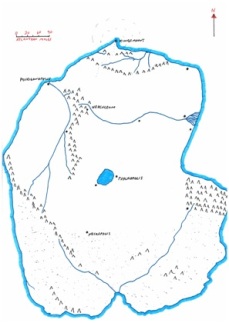Atlantis
Era
Atlantean (approximately 12,000 years ago).
Location
Atlantis was a large island in the Atlantic Ocean, off the east coast of the North American continent (which the Atlanteans called simply "the Western Continent").
Description
Atlantis covers an area of approximately 360,000 square miles and encompasses several climate zones and terrain types.
The south of the island is a sparsely populated region of low rainfall, arid plains, desert valleys, and high, bare mountain plateaus. The north has a more benign climate and comprises rolling prairie land broken by low mountain ranges and regions of dense coniferous forest. There are few major predators in the north, though many species of supernatural animals, resulting from ancient Lemurian experimentation, can be found predominantly in the south.
The population of Atlantis is concentrated around the major cities of the north, however the majority of the population is rural, living in towns and villages on the vast tracts of arable land that surround and support each city. Spreading out from each city is a road network connecting lesser towns. The total population of Atlantis is uncertain but may have been 5–7 million by the time of its fall, with no more than 1.5 million living within the cities.
The most important cities are found on the coast, as the Atlanteans are a predominantly seafaring people.
History
At some point in the Late Cretaceous era (approximately 90 million years ago), a large sliver of the eastern coast of North America split off from the landmass and became a separate island in the Atlantic Ocean. This was the island of Atlantis. It continued to separate from North America as tectonic activity moved North America further away from Europe.
Flora and Fauna evolved in isolation on Atlantis. At some point after the last glacial maximum (approximately 18,000 years ago), early humans somehow came to the island and colonised it. It is theorised that these humans came from a proto-advanced civilization in Mesoamerica, but there is no hard evidence to support this theory. The question of which early civilization seeded the other—Atlantis to Mesoamerica or vice-versa—is one of the most fiercely debated questions among antiquarians.
Civilizations rose and fell on Atlantis over a period of 6,000 years, punctuated by warfare and descent into undocumented dark ages.
By 14,000 years ago (at which point the generally accepted "Atlantean calendar" began), the Atlantean civilization had settled into a number of insular city states which existed in a peaceful political and economic alliance. Outside the cities roamed monsters created during the Lemurian wars, and the population lived in fear inside their cities.
Scientific advancement stagnated during this time, and magic became ascendant. A group of sorcerers realised they could seize power by exploiting the common man's fear and superstition, and began to align their magical powers to the worship of gods (which it appears they invented) and call themselves priests rather than sorcerers. Raising a theoretically all-powerful king over all Atlantis to act as their puppet, their temporal and spiritual power became absolute. Gradually the new Atlanteans' power spread, as they reclaimed the northern parts of the continent and confined the monsters to the south.
As centuries passed, individual cities rejected the power of the throne and became self-governing, typically on some democratic model. The line of kings eventually ended, and was forgotten—virtually wiped from history—everywhere except the city of Kingsmount, where an appointed regent still governed "in the King's name".
A relatively peaceful and prosperous era lasted for several centuries, until a chain of events culminating with the appearance of the supernatural entity known as the Demon Queen opened the door to a world-wide war and the fall of Atlantis.
Society and Technology
Atlantean technology of this era was far in advance of the bronze-age cultures of the Eastern Continent. Atlanteans worked iron and steel, sailed in square-rigged oceangoing ships, built multi-storey buildings in both the classical and gothic styles, and had advanced knowledge of mechanics and chemistry. In many respects, the level of scientific and technological knowledge matched that of Europe in the Renaissance of the 14th–16th centuries.
Atlantean social customs resembled a mix of the cultures that are familiar to us from European history. Religious practices, the trading of slaves, and the city-centric democracies were all reminiscent of Hellenic culture (or, more correctly, Hellenic culture would model itself on distant memories of Atlantis, many millennia later), while the feudal and heraldic practices found in many places in the island's interior more closely resembled Mediaeval Europe.
Important Cities
- Kingsmount
- Poseidonopolis
- Necropolis
- Herculeum
- Psychopolis
- Athenaeum
